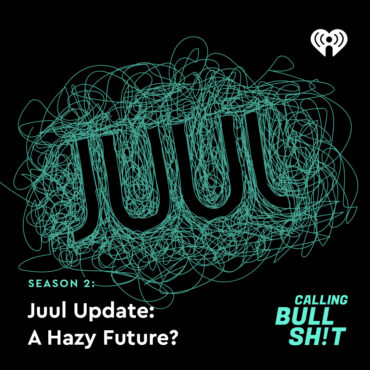
Juul Update: A Hazy Future?
The FDA recently made a series of decisions that will make it more difficult for Juul to stay on the market, will that decision help teens quit vaping or just […]
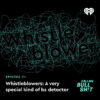 play_arrow
play_arrow
Whistleblowers: A very special kind of bs detector Calling Bullsh!t
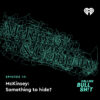 play_arrow
play_arrow
McKinsey: Something to hide? Calling Bullsh!t
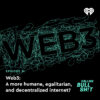 play_arrow
play_arrow
Web3: A more humane, egalitarian, and decentralized internet? Calling Bullsh!t
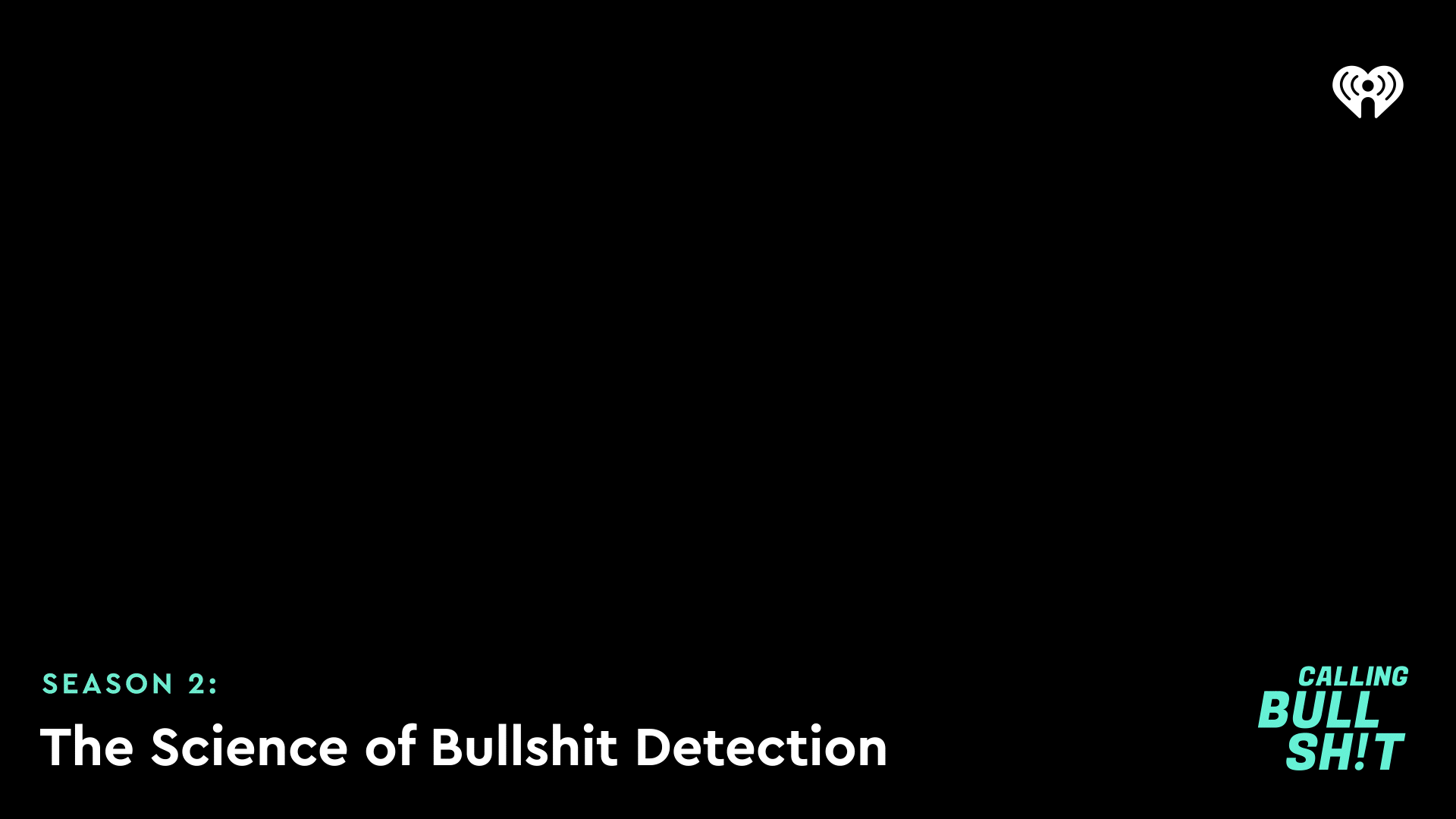
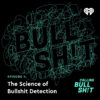 play_arrow
play_arrow
The Science of Bullshit Detection Calling Bullsh!t

Professor and Author of the
“The Life-Changing Science of Detecting BS”
In his book “On Bullshit”, the moral philosopher Harry G. Frankfurt wrote that “One of the most salient features of our culture is that there is so much bullshit.” Is that just a pessimistic way of looking at the world or is it true? And how to do we protect ourselves from all of the bullshit surrounding us? To find out, we called up an expert, John Petrocelli professor and author of the book ‘The Life-Changing Science of Detecting BS,’ to figure out what people are influenced by and why.
I do think our late millennials and gen Zs grew up hearing about concerns with the environment…and I think they’ve developed into a more socially conscious group than ever before.
– John Petrocelli
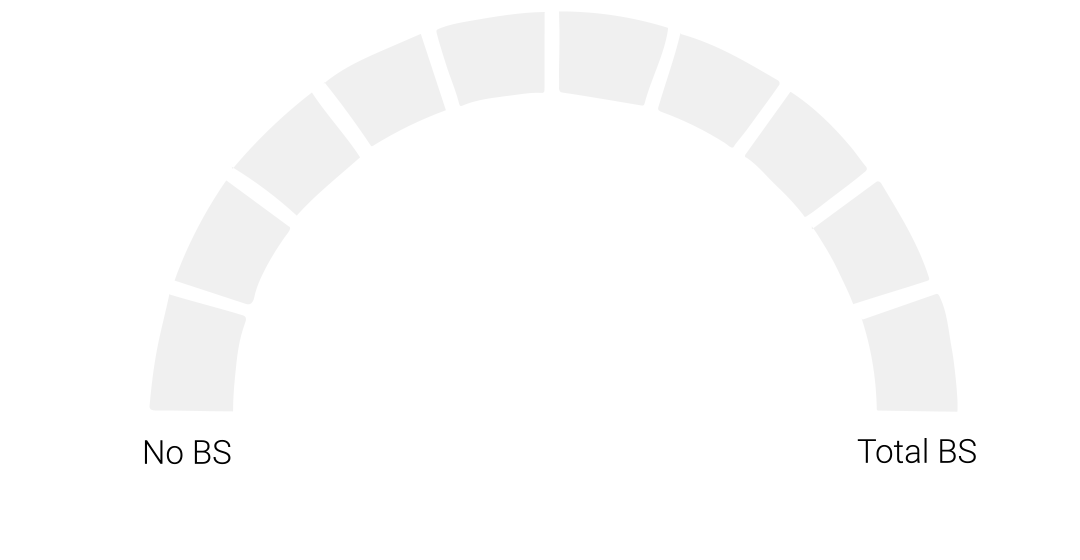
SFX: Ty in the booth saying things like – Is this mic on? Testing. Warming up, ok ready to go. Large book, pages riffling/turning. “Let’s see here, Bubble, Bullseye, ah, here we go – Bullshit” Ty finds the word and reads
TY MONTAGUE (VO) Bullshit.
TY MONTAGUE (VO) Exclamation, noun. Complete nonsense or something that is not true.
MUSIC: Small World Reveals [SOTS] Bullshit examples from Man on the street cut together with SOTs and VO reach a crescendo and then cut off before the final question.
TY MONTAGUE (VO) Verb. – to try to persuade someone or make him or her admire you by saying things that are not true. [SOTS] Bullshit examples from Man on the street cut together with SOTs and VO reach a crescendo and then cut off before the final question.
TY MONTAGUE (VO) Is bullshitting simply human nature? Is there even a difference between bullshit and straight up lies?
TY MONTAGUE (VO) Why is Bullshit everywhere?
MUSIC: In Passage
TY MONTAGUE (VO) Welcome to Calling Bullshit, the podcast about purpose-washing — the gap between what an organization says they stand for and what they actually do — and what they would need to change to practice what they preach. I’m your host, Ty Montague. I’ve spent over a decade helping organizations define what they stand for — their purpose — and helped them to use that purpose to drive transformation throughout their business. Unfortunately, at a lot of institutions today, there’s still a pretty wide gap between word and deed. That gap has a name: Bullshit. But — and this is important – bullshit is serious, but it’s also a treatable condition. So when our bullshit detector lights up, we’re going to explore everything we can do to fix it.
TY MONTAGUE (VO) Hi Folks! Welcome to season two of calling BS.
MUSIC: Trailrunner
TY MONTAGUE (VO) In season one we looked at a number of bullshitting organizations, developed the BS Index, and worked with our guests to imagine a bunch of ways to actually fight BS. Here on the show, we say bullshit is the gap between word and deed – it’s in our intro and it’s what the BS scale is all about- but not everyone defines BS exactly the same way. So we thought… Let’s kick off season two by diving into BS itself. What is it? Where does it come from? At what point does it become dangerous? And how can we all keep our BS detectors in fighting shape?
SFX: BS detector
TY MONTAGUE (VO) To begin, we examine the origins of the phrase. The first surprise? It’s not a euphemism for cow poop. The “bull” in bullshit isn’t the animal. It may actually reference the last name of Obadiah Bull, an Irish lawyer living in London in the late fourteen hundreds, famous for spouting nonsense.
TY MONTAGUE (VO) It may also have originated back in the days when the Pope wrote decrees on parchment and authenticated them with a metal seal called a “bulla”, leading to the shorthand phrase “Papal Bull.
TY MONTAGUE (VO) And Shit likely comes from ‘SHITTE’, the staff carried by ancient Scottish warlocks.
SFX: BS detector goes off
TY MONTAGUE (VO) Just kidding. Actually, “shit” likely comes from the old English word “schitte” for dung – no mystery there.
TY MONTAGUE (VO) But where there is a bit of mystery is when bullshit became slang. One thing we do know for sure, is that TS Eliot used the two words side by side in his poem “the Triumph of Bullshit” written in the early nineteen hundreds.
TY MONTAGUE (VO) More recently, the concept was picked up by the moral philosopher Harry G. Frankfurt. In his book “On Bullshit”, published in 2005 Frankfurt writes that “One of the most salient features of our culture is that there is so much bullshit.”
TY MONTAGUE (VO) To see how Frankfurt’s theory holds up today, we sent our producer’s Haley Paskalides and Parker Silzer to ask New Yorkers what they think.
PARKER Would you agree or disagree with the following statement? One of the most common features of our culture is that there is so much bullshit.
ERIS Oh, 100%. Yes.
CHRISTOPHER 100%.
BILAL No, I’m an optimist. I have always been struck by, How much people really care about the truth of the matter. I think a lot of the time people are pretty bad at, Seeing past the bullshit, but they really care to.
DRUMS OVER GUNS The symbolism of bullshit is on wall street. Don’t they have the bull there? I rest my case. It is the bull. They, they are transparent, transparent in their bullshit.
HALEY And do you think that one of the most common features in society today is bullshit?
ALLISON Nowadays. Yeah,
JACK Yeah. Yeah. I agree with that. the government’s definitely hiding a lot of things from us that we, that we don’t know about.
ERIS Politics. Everyone. Yeah.
MICHAEL Oh absolutely
ERIS It’s just everywhere
TY MONTAGUE (VO) The idea of Bullshit and Bullshitting can seem harmless or even funny. But, as a listener of this show you know that BS is used to deceive and confuse in ways that cause lasting harm. But why do people BS? And why is it so hard to stop it once it starts? To find out, I called up a real expert.
JOHN PETROCELLI Hello, I’m John Petrocelli, uh, professor of psychology at Wake Forest University. My specific research has really focused on persuasion, metacognitions, or thinking about thoughts that we have, and of course, bullshitting, and bullshit detection.
TY MONTAGUE (VO) John runs the Bullshit Studies lab – yes it’s actually a real thing – where he designs experiments to test how we are affected by the social world.
JOHN PETROCELLI Just basic judgment and decision-making.
TY MONTAGUE (VO) Basically he tries to understand what influences people. Looking at external information and social environments as well as our internal biases. But the reason I first got in touch? He wrote this book…
JOHN PETROCELLI The Life-changing Science of Detecting Bullshit.
MUSIC: FasterFasterBrighter
TY MONTAGUE (VO) When I first saw that title, I thought, “why would he write a book when he could just do a podcast?” but after I read it, I knew I had to call him up.
TY MONTAGUE I got, gotta say I loved your book, not surprisingly, maybe given the show, but, can I ask you, I noticeI notice you draw a distinction between bullshitting and lying, which seems like an important distinction. Can you just unpack that difference?
JOHN PETROCELLI Yeah, absolutely. Bullshitting is often confused for lying, but it’s, very distinct from lying and in some very important ways. So, when someone lies to us, the liar is actually concerned about the truth, right? And their objective is to get us to believe something that they don’t believe is true themselves. On the other hand, the bullshitter doesn’t really care at all about the truth and they’re not paying attention to it at all. In fact, they, they have no idea what the truth is.
TY MONTAGUE (VO) It’s weird to me that anyone wouldn’t care about something as important as the truth, but John says there are two major motives for bullshitting.
JOHN PETROCELLI And One of the motives is to be consistent with our actions and what we say, and we’re also motivated to feel justified by the claims that we make and our behaviors. And once you publicly state something, you get a lot of social pressure added to those motivations.
TY MONTAGUE (VO) As John explained this, my mind immediately jumped to when– after Trump was sworn in on the National Mall– Sean Spicer told the world [SOT] Sean Spicer: This was the largest audience to ever witness an inauguration period.
TY MONTAGUE (VO) It most assuredly was not. But the administration wouldn’t cave, and Senior Counselor Kellyanne Conway doubled down BIGLY on CNN the following day.
[SOT] Alternative Facts: Chuck: Why did he do that? It undermines the credibility of the entire white house press office on day one.
Kellyanne: So don’t be so overly dramatic about it. Chuck what you’re saying, it’s a false hood and they’re giving Sean Spicer our press secretary gave alternative facts
TY MONTAGUE (VO) They definitely didn’t care about the real numbers
[SOT] Alternative Facts: Chuck: You sent the press secretary out there to utter us falsehood on the smallest, pettiest thing.
[SOT] Alternative Facts: Kellyanne: I don’t think. Maybe this is me as a pollster Chuck and you know data well. I don’t think you can prove those numbers one way or the other. There’s no way to really quantify crowds. We all know that.
JOHN PETROCELLI That would be textbook bullshitting. So, whereas the liar doesn’t uh believe what it is that they say is true, the bullshitter really has no idea whether or not it’s true.It’s very easy today to say something that’s not very well thought out, that’s not very well-informed, and then to feel as though you have to support it, right? Because now you’re going to sound inconsistent and you’re going to sound, stupid for, for communicating something that either we know isn’t true or isn’t supported by evidence. And it’s very seductive once you publicize it. So it’s, it’s much better to sort of think, collect evidence and, and, and see whether or not well, is, is there evidence for against, what, what my opinion is on the issue? But, and so I think those are sort of two major motives, especially once people start communicating their opinions and their beliefs.
TY MONTAGUE (VO) But the other key distinction here is that society treats liars differently than it treats bullshitters.
JOHN PETROCELLI When people lie to us, you know, there’s, there’s often a lot of great negative consequences, you know, we’re very unhappy with liars.
TY MONTAGUE When we catch them.
JOHN PETROCELLI Yes, exactly. But, but when we know, kind of know someone’s bullshitting us, we often assume that it’s harmless, we pass it off as sort of a mild social offense. But this is where we can’t be more wrong. Virtually all of our problems, whether they be personal, interpersonal, professional, or societal, they appeared to stem from mindless bullshit reasoning and communications. So what I wanted to do was to sort of put something together that puts the problem with bullshitting front and center and, to call attention to it and to expose how dangerous it can actually be.
TY MONTAGUE Right. And I I totally agree. We underestimate the seriousness of the impact of bullshit. And you list a number of ways that BS can be damaging- in some cases life-threatening- and you use a scale in the book, which I love
TY MONTAGUE (VO) John uses the Bullshit Fly Index – one fly is harmless bullshit, two flies is bad – and three flies: dangerous.
JOHN PETROCELLI So harmless might sound something like, “you know, I could throw a football over a mountain in 1982”, you know, and you get, you get that eye rolling. And in fact, some examples of, of bullshit to the extent that keeps a few kids from peeing in the pool. But then I contrast harmless with the two fly example of bad bullshit. My favorite example of this is, “Did you see her face? Who would vote for a face like that?” I think that kind of bullshit. It dehumanizes, objectifies women, it’s suggests that they can’t be good leaders and unless they’re attractive, I mean, what doesn’t make much sense. But the three fly example might sound something like this, “You know, Ty, I can text while driving without any problems and, and you know what everyone does it. And so I don’t see the problem.” Okay. And I, my, my response to that is no, no, no, no. Not only are these things, not all true. But they are able and likely to cause harm and injury to oneself and others, to the extent that that you actually believe it is true. And so to say something like that just completely ignores, completely neglects truth, established knowledge and genuine evidence. That would be the more dangerous form of bullshit.
TY MONTAGUE Why are we so vulnerable to BS? Why don’t we all have better BS detectors?
JOHN PETROCELLI There are two primary reasons for why people are not generally good at discerning bullshit from the good stuff. First, most people believe that they’re somehow immune to bullshit and actually research suggests that the most confident people are often the most likely to be duped by bullshit. And this is why one of the reasons I really love this new show on Netflix, Bullshit: The Game Show with Howie Mandel.
JOHN PETROCELLI So there’s the, there’s the main contestant. The main contestant is supposed to either answer questions correctly, or to convince one of the three challengers that their incorrect answer is actually correct. And if they can either answer correctly or convince one of the three challengers that they’re incorrect answer is correct, then they can move on to the next stage and ultimately win a million dollars. But what’s interesting is when they bring on each of the three challengers, each one of them talk smack about how good they are detecting BS, right. Then the show proceeds and you can see how miserable most people are at actually detecting it.
TY MONTAGUE (VO) Many of us have overconfident but underperforming BS detectors. And John says there are a few reasons for this.
JOHN PETROCELLI I mean the research in cognitive psychology by Janet Metcalf has shown that people do not study subjects they feel they’ve already mastered. They stop, they go onto something else. And then, second reason is that even before we suspect, we might be exposed to bullshit, we fail to ask the right questions. We fail to ask, well, what exactly is the claim? And then another question that’s, that’s hardly ever asked is how does this person know that this claim is true? So if you ask someone, how, how do you know what you’re saying is true, Ty? You know, most people will, will quite, will tend to be surprised because that’s not a common question to ask and then they’ll take a few steps backwards and they’ll already start to kind of clean up their first answer, you know? Well, you know, there’s, there’s these situations that it’s not entirely true. So let me clean that up. Let me give you some of the qualifiers. And then when you narrow back down it’s really good to ask, how might the claim be wrong? People tend to answer the, “how do you know it’s true?” only with confirming evidence. So you have to directly ask people and nudge them to consider the ways in which the claim might be wrong.
TY MONTAGUE Right. And just to draw a line under this for the audience you make the distinction between why questions and how questions in the book and your thesis, is that why questions are a little easier to slip out of then how questions, how forces somebody to really bring evidence into the conversation.
JOHN PETROCELLI Yeah, usually when you ask why questions, you kind of get a value laden sort of a heady abstract response, but when you focus people on how, it tends to elicit a more concrete response where they maybe even for the very first time, take a few steps back and say, “okay well, what, what are the actual reasons to have this opinion or this belief?” And then you can make a better decision as to whether or not you’re really buying what it is that they’re selling.
TY MONTAGUE Right. In the book, you, you coined a term, which I really liked, which is bullibility. I assume it’s a comparison to gullibility.
JOHN PETROCELLI Yeah. This is, this is a word that I made up
TY MONTAGUE Yeah,
JOHN PETROCELLI So a gullible person is likely to believe something, you know, despite the signs of dishonesty, somebody who’s a, especially bullible we would say that well they tend to be a relatively lazy thinker who doesn’t even care about the signs of dishonesty. And one of my favorite sort of examples of this has to do with a clip that 60 minutes aired in 2007, of Bernie Madoff kind of sitting around and recruiting new investors in his hedge fund. And one of the things he said was,
[SOT] 60 Minutes Madoff: I’m very close with the regulators. So I’m not trying to say that they can’t, you know, that what they do is bad..
JOHN PETROCELLI He was talking about the SEC,
[SOT] 60 Minutes Madoff: You know, in today’s regulatory environment, it’s virtually impossible to violate rules when this is something that the public really doesn’t understand, but you it’s impossible for you to go under for a violation to go undetected. Certainly not for a considerable period of time.
JOHN PETROCELLI It’s impossible for a violation to go undetected, you know, certainly not for a considerable period of time.”Right. Well, that clearly wasn’t true. I mean, Madoff proved that for 18 years.
TY MONTAGUE (VO) Maddoff truly is a cautionary tale. Everyone was investing in Maddoff, so no one really thought to look at the facts. And this is where things get sticky. Even people with the most discerning minds want to belong. And when John brought up this one study from the 1940s, I realized that this desire can be stronger than our sense of right and wrong.
TY MONTAGUE (VO) The experiment was conducted by the psychologist Solomon Asch.
JOHN PETROCELLI He brought in one participant, for a number of trials,
TY MONTAGUE (VO) This one real participant would be joined by a handful of assistants, or confederates, posing as other participants.
JOHN PETROCELLI And they would set it up such that the actual participant always thought they were late to the experiment and there was one seat open, and each trial in the experiment just consisted of very obvious answer to a question.
TY MONTAGUE (VO) They were shown a target line of a certain length, and then presented with three other lines, labeled A, B, or C. And one of these lines was the same length as the original line.
JOHN PETROCELLI The other two, mismatches were completely wrong, very, very obvious. And what would happen is the first four or five confederates working with the experimenter would start to respond incorrectly, intentionally, to these trials. And the actual participant would look dumbfounded and be like, what in the world
TY MONTAGUE What’s wrong
JOHN PETROCELLI obvious. They’d be like
TY MONTAGUE Right? It’s so
JOHN PETROCELLI Their glasses and kind of squinting. And they knew that the response that was verbally given by the other confederates was wrong, but what Ash found, was that people tend to feel pressured to go along with the group.
TY MONTAGUE (VO) In other words, even when the real participant clearly saw the wrong answer being given by everyone else, they still went along with it.
JOHN PETROCELLI They did not go along with the group when they had a chance to respond privately. But when they had to respond publicly, they tended to go along. They tended to conform to the group.
TY MONTAGUE So, what is that about?
JOHN PETROCELLI Well, especially when situations are ambiguous, you can even magnify this difference when it’s not clear what the, the, the answer is people conform to the group even moreso.
TY MONTAGUE (VO) We tend to think the group knows something that we don’t. But what’s wilder to me is that even when the other people in the group are strangers to us, our fear of group rejection can cause us to override indisputable facts.
JOHN PETROCELLI All of the participants were complete strangers. But they were peers. And, you know, if you get peers together, even peers that you don’t know personally, there’s that general sense of pressure to go along with the group, because there’s a fear of being rejected, a fear of being avoided it’s, much more impactful than most people would believe.
TY MONTAGUE (VO) So what does this say about the proliferation of BS in our society? Even when we see it, it’s hard to call it out! The Asch experiment is like – the snowflake on the tip of the iceberg of harm that can be done when people go along with BS that they privately disagree with. I’m guessing this part of why whistleblowers at high BS companies are so few and far between. How can we expect to fight the rising tide of real BS when it’s hard to call out to the length of an arbitrary line? How can we trust anything or anyone, if this is the default setting on our internal BS detector?
TY MONTAGUE (VO) Answers to these questions and more. After the break.
TY MONTAGUE All right. So, now we’re pushing into just another area of interest for us there have been a lot of, or many assertions in the media in particular that we’re actually experiencing a crisis of trust in the world, especially among young people. First of all of you, have you seen any of those assertions and do you agree? And if so, do you feel like BS is one of the culprits?
JOHN PETROCELLI I do think, our late millennials and gen Zs. they, I mean, they grew up hearing about concerns with the environment, even like sort of our late generation X-ers, they’re, you know, we grew up, you know, concerned about greenhouse gasses and aerosol spray cans and things like that. And, and I think it’s developed into a more socially conscious group than ever before. And I think there’s a little bit of evidence that tend to have a better memory for bullshit and lies. I mean, this sort of the underpinnings, I think of cancel culture. Um, I think there are some benefits to, I mean, what we would usually call that in social psychology is accountability. You know, when you have to justify, you know, when you have to justify your, your, your beliefs and your opinions, people tend to, uh, feel, feel that social pressure, and they don’t bullshit as much. But I think, you know, if, if someone like, Nike president and CEO, John Donahoe, or, Phil Knight, you know, again, if they say, we’re gonna address the carbon footprint problem by doing this, we’re gonna address sweatshop uh, problems by doing that. If they don’t do it, you know, there’s a major base of the consumers that are not going to be happy and they’ll, and they’ll cancel them. It’s basic accountability, but I think it’s one of the major things that is going to combat the unwanted effects of bullshit.
TY MONTAGUE Yeah. we completely agree. I think that’s a good segue point to some, some questions that I have, that directly relate to the work that we’re trying to do on this podcast because you know, our show was, was born out of reflections on the attack on the US Capitol and the role that bullshit as we define it, played in it. Specifically fomented by, by our friends at Facebook. You know, they claim that their purpose as a company is to empower all of us to build community and bring the world closer together, and meanwhile, what they’re really doing is feeding us, deceptive and polarizing content that clearly, in some cases, whips us into a violent frenzy. And so it’s that gap between what they say they stand for and the actions that they’re actually taking that we define as, BS on this show. So what do you think of our definition? Because in some ways it seems very much the same- I sense a kinship with, your work- but is it in some ways different?
JOHN PETROCELLI I think w what you are actually hitting on is, is a special case of bullshit. In most cases, I think you’re hitting on what we call “pseudo profound bullshit”.
TY MONTAGUE (VO) Pseudo profound bullshit, or flowery catchy language that can be hard to decipher, is everywhere in the marketing landscape. And when a company’s statement of purpose is purely marketing, it can fall into this category as well.
JOHN PETROCELLI And it’s, it’s clever language because it can, it can actually mean all sorts of things.
TY MONTAGUE Right. Hard to pin down.
JOHN PETROCELLI Exactly. It doesn’t have to mean what you think it means, or, or maybe it could. If you ask for clarification- here’s, here’s where it’s really clever though- is if you asked for clarification and now I can gauge what you think it should mean, you know? And I could say, yeah, you know, you got it. That’s what it means. I recall this, this, this classic conversation between the evolutionary biologist Richard Dawkins and Deepak Chopra, and Dawkins challenged Chopra to explain the mystification of quantum mechanics in his aging reversal sort of theory,
[SOT] Chopra/Dawkins Dawkins: Where did the quantum theory come into that?
Chopra: Oh, it’s just a metaphor. Just like, uh, an electron or a photon is an indivisible unit of information and energy, a thought is an indivisible unit of consciousness.
Dawkins: Oh, so it’s an, it’s a metaphor for a year for a unit and nothing to do with quantum theory as in Physics.
Chopra: No, I think quantum theory has a lot of things to say about observer effect. There are a school of physicists who believe that quantum leaps, for example, are examples of discontinuity and uh creativity in consciousness is also an example of discontinuity. And that healing may be a biological phenomenon that relies on biological creativity.
Dawkins: So it sounds like a sort of poetic use of the word discontinuity. It’s actually confusion. Isn’t it to bring in, um, quantum theory, other than, as a metaphor. So it sounds as if you’re both doing it as a metaphor and a little tinge of, of something like what physicists are talking about as well.
JOHN PETROCELLI Dawkins kind of accepted Chopra’s retreat, I mean, Chopra just moved the goalpost. So this is, this is the problem with this type of language and you see it, especially in the, in business, in the corporate world, it’s just, it’s just, everywhere.
TY MONTAGUE Yeah. And that’s what we’re, trying to wade into and hopefully clarify for some folks because we have our own, our own scale, which is slightly different rather than measuring BS in flies, our scale is a hundred point scale, zero being the best zero gap between word and deed zero BS. And 100 being the worst total bullshit. So we rate all the companies that we feature on the show. And as I read your book, I realized that on our scale, we might be combining BSing and lying might live on the upper end of all our scale. So what’s your take on that? Is that is knowingly BS-ing in that way the same as lying, or is there a distinction to be made there?
JOHN PETROCELLI Yeah. Well, I think well there’s nothing wrong with your scale. I think it’s, it’s perfect. It’s perfect for expressing a social perceivers’ guesstimate of lying, I think because once it’s intentional and you know, something isn’t true, then I, I think you are, you’re moving into, to lying and further away from, bullshitting. But yeah, I think, I think the scale of sort of like, well, what, you know, based on what they say and what they actually do, I think it’s a very useful scale you’ve got.
TY MONTAGUE Thank you. I appreciate that.
TY MONTAGUE So you have a daughter. What, what advice do you give her or would you give any young people today who face this, you know what feels like a rising tide of BS in the world? How should they think about fighting this fight?
JOHN PETROCELLI Yeah. Well you mentioned my daughter. I mean, she’s one of my best, bullshit detectors. I’m not permitted to bullshit at all. I remember when she was four, for whatever reason, I told her, you know, when I played high school football, we won all of our games. And at age four she’s oh Dad, no. Come on now, you did not win all of your games, you know? But, what I would advise her and, anyone to do now, is just to sort of take a step back when you hear something, you read something, you see something that may or may not be true, think about the consequences that it has if you actually believe it. What consequence would it have for your behavior? How might it change your decisions? How might it change your beliefs and your opinions? And then to simply start asking questions. You can kind of flip some of those questions onto the self and Say, well, who is telling me this? You know, how do they know it? How could they possibly know it? And what are they trying to sell me? What agenda do they have? These are like just basic, critical thinking skills. But, but I would say, just stick with the claim, you know, don’t attack the person, attack the claim. And then suggest, oh, “okay I used to understand, I used to think of it that way too,” sort of misery loves company kind of approach, you know, they’d be like, well, yeah, I, yeah, I could see how you
TY MONTAGUE Right I was tricked into believing that before. Yeah,
JOHN PETROCELLI Yeah, because it’s just an easier pill to swallow if it’s just kind of an error in reasoning that it was like, oh, they’re just misinformed and they’re guilty of bullshitting. But another, another thing I think is, is, good to admit is that we, we all contribute our own amount of bullshit, and to not double down on the bullshit, but just kind of admit it, you know, when, when we’re guilty of it. Finally be ready, you know, be ready to model a better behavior, you know, be willing to provide and offer evidence-based reasoning, to counter and combat bullshit. Y’know, the hope and the dream is, is to really reduce bullshit and it it’s unwanted effects, but it’s going to have to be a collective effort.
TY MONTAGUE You know, there is a whole generation of young people who are taking a very activist stance on these things. They’re not putting up with the bullshit anymore. And that’s one of the audiences that we most want to provide information for on this podcast.
JOHN PETROCELLI I love the concept of your podcast. I think it shines a lot of sunlight on problems. And I believe that that, what we need to advocate is treating bullshit, like lies. If we treat bullshit, even though I say, okay, well, it’s bullshit. Don’t assume that it doesn’t have a negative effect.
TY MONTAGUE Right.
JOHN PETROCELLI Don’t assume that it’s harmless.
TY MONTAGUE John, this was a fantastic conversation. I want to thank you for coming on the show today.
JOHN PETROCELLI Alright Ty, Thanks for having me!
TY MONTAGUE (VO) So this is the part of the show when I would usually rate an organization on the BS scale. But instead of giving a score today I want to talk about how the BS scale actually works. We define Bullshit as the gap between word and deed. And we measure that gap by looking at the evidence – talking with experts who can help us understand the actions companies are taking to live – or not – their purpose. Once we have asked as many questions as we can, we construct the final score using these three guideposts:
TY MONTAGUE (VO) And if you are a future or current purpose led business leader, or a conscious consumer, here are three takeaways from John that will keep your BS detector in great shape.
TY MONTAGUE (VO) And if you want in on the fight against BS , subscribe to the Calling Bullshit podcast on the iHeart Radio app, Apple Podcasts, or wherever you listen to people speak into your ears. Thanks to our production team. Hannah Beal, Amanda Ginsburg, Andy Kim, DS Moss, Haley Paskalides, Parker Silzer, Basil Soper and Mijon Zulu. Calling Bullshit was created by Co Collective and it’s hosted by me, Ty Montague. Thanks for listening.


Calling Bullsh!t October 3, 2022
The FDA recently made a series of decisions that will make it more difficult for Juul to stay on the market, will that decision help teens quit vaping or just […]
Post comments (0)